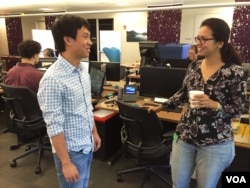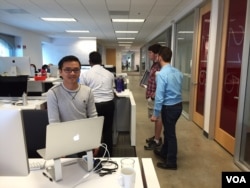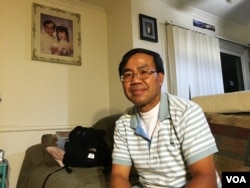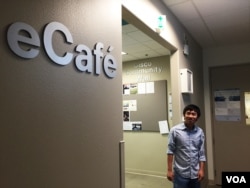For Tang Kengsreng, moving to San Jose two and a half years ago was not easy.
The 29-year-old Thbong Khmum province native had worked as a software engineer in Phnom Penh for three years and previously lived in Iowa as an international student.
He didn’t know any fellow Cambodians here, let alone others working in the tech industry.
“For us new arrivals, we don’t have friends or people you know, and language is a bit of a problem. Moreover, cultural difference is also a problem. I grew up in Cambodia and am used to the lifestyle there. Simply put, coming to live here is like a 180-degree turn,” he said.
Now a software engineer at Cisco Systems, he tells VOA Khmer his dreams have come true.
“As a software engineer, I love it here. When I was in Cambodia, whenever Apple launched a new product, I would stay up late at night to watch the live announcement on television to feel what it would be like to be there [Silicon Valley]. I wanted to be there physically and be part of it, and a be code writer [software engineer] there.”
Centered in the Santa Clara valley between the cities of San Jose and San Francisco, Silicon Valley is generally considered the technology capital of the world. It’s home to technology giants like Apple, Google and Facebook. According to recent census data compiled by the Silicon Valley Institute for Regional Studies, more than a third of its working residents are foreign-born, much higher than the national average of about 13 percent.
Numerous well-educated science and engineering professionals from Asia, particularly China and India, have flocked to the valley.
But for young Cambodians like Kengsreng, as well as second-generation Cambodian-Americans, moving to the area is a far cry from their homes and those of their parents, many of whom lived through the Khmer Rouge years.
Another pioneering tech professional, Mok Sophal, 31, also software engineer, agreed that they were fortunate to be at the cusp of innovation.
Sophal worked across the U.S., in Salt Lake City, Utah, and for Microsoft in Seattle, Washington, before moving to San Jose to work with Target’s online team.
Even within the U.S., he says, the region is unique in terms of the opportunities it affords employees.
“For technologists, this is the number one place to be,” he said. “Here is where you can develop yourself and have more opportunity in the future to further develop yourself or build a company or a startup.”
However, there are downsides to this apparent silicon paradise.
Rent is high, as are stress levels. Sophal says it is not easy to make new friends. “Life here can be lonely and everyone is busy with their work,” he tells VOA Khmer.
Maya Gilliss-Chapman hopes to change all that.
The 25 year old was adopted by American parents and founded Cambodians in Tech in 2014 with a view to encourage Cambodians to get into the industry and connect those already working in Silicon Valley.
While she shares Sophal’s occasional loneliness, Maya, who works for a start-up, said her organization was “first off, a community, because I don’t want people to ever feel the way I felt and that was alone.”
Kengsreng and Sophal have also struggled with the language barrier, miscommunication and higher expectations of their performance.
“It’s a combination of language and culture. For example, in Khmer (Cambodia) you would never tell someone ‘this work is like trash. Just throw it away.’ But here some people say that.”
Boun Sambun, 57, was one of the first Cambodians to arrive in the area and get into the tech industry. He understands the excitement of young Cambodian professionals, as he worked as an electrical engineer for Intel, the firm that produced the silicon chip that led to a computer revolution and gave the valley its name.
He prides himself on contributing to the digital revolution, but he says as he gets older he is yearning for a slower pace of life.
“Life is too fast here. So living in Silicon Valley, we always have to “keep up.” You can’t just stop learning after gaining a skill and work in the same job until you retire. You always have to keep an eye on the constant change of technologies. So you have to learn forever.”
He eventually plans to retire in Cambodia, saying he would not be able to afford to keep his house in San Jose after losing his job at Intel.
All four of the Cambodian tech pioneers VOA spoke to for this report were grateful for the experience, but saw their ultimate goal being making a contribution to Cambodia.
Gilliss-Chapman and her colleagues at Cambodians in Tech are in Cambodia this week to launch an initiative that aims to directly connect Silicon Valley to Phnom Penh’s fledgling tech sector. She hopes to one day bring more young tech-savvy Cambodians to come and experience Silicon Valley.
Kengsreng shares this goal. Although his lifelong dream to be here has been slightly disrupted by the realities of an immigrant’s experience inside the world’s tech capital, and while the magic of the Valley has somewhat faded with time, Kengsreng encourages more young Cambodians to dream big and to find a way to experience Silicon Valley one day.
“If you come here physically, you can experience what it is like to be at a global tech company, how they operate. It is an experience that will be hard to find in our own country.”









